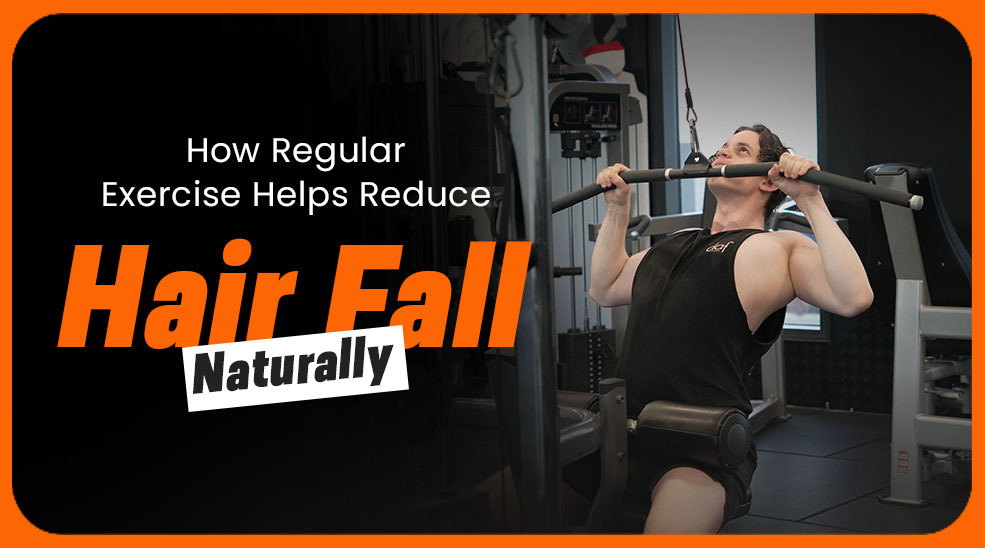ALWAYS OPEN! WE WORK 24/7

There are numerous reasons for hair fall: genetics, hormones, diet, medication, and other medical conditions, and sometimes stress. We cannot change our genes, but there are many natural, evidence-based, researched ways to prevent or reduce hair fall, and regular exercise is perhaps the most influential factor. Exercise won’t change your DNA, but it creates an environment within your body that supports healthy hair by: improving blood flow;inducing hormone balance; reducing inflammation; reducing stress; enhancing nutrient delivery; and preparing you to sleep better. Here are several ways movement can protect your hair, and what you actually need to do.
1. Enhanced scalp blood flow and nutrition
Exercise increases heart rate and, thus, the flow of blood to all areas of the body, including the scalp. Hair follicles require blood as a delivery system for oxygen, amino acids, and micro-nutrients like iron, zinc, and vitamins that are essential for hair growth. Enhanced blood circulation will keep the follicles nourished and active.
2. Reduced levels of stress hormones, and stress causes hair loss
Chronic psychological stress increases cortisol and can push hair follicles into a dormant phase called telogen, or a resting phase, which results in hair falling out. Regular, moderate exercise, on the other hand, will decrease perceived stress and over time it will reduce baseline cortisol levels, allowing hair to remain in its growth phase, or anagen.
3. Improves insulin sensitivity and hormonal balance
Poor metabolic health, characterized by insulin resistance and hormonal dysregulation, is another factor that can decreases in hair density, especially in conditions that are sensitive to androgens. Exercise improves insulin sensitivity and helps re-establish the hormonal balance of the body, in turn helping hair growth.
4. Decreased chronic inflammation
Chronic inflammation is associated with the majority of types of hair loss. Exercise can, in turn, decrease chronic, low-level inflammation especially when combining both resistance and aerobic exercise, both of which help support immune function and metabolic health.
5. Improves sleep and recovery
Good sleep is very important in the repair of tissues and hormonal balance. Regular physical exercises improve both quality and length of sleep, hence promoting hair growth and repair processes.
6. Enhances overall nutrient absorption
Active people have better appetites; they also put to good use whatever nourishment comes their way. Besides, in combination with proper diet, exercise will facilitate how well the body uses protein, iron, and other hair-supportive nutrients.
You don’t have to do crazy workouts to save your hair; it is more about being consistent than it is about doing intense workouts.
Aerobic exercise- 3-5× a week, either brisk walking, running, cycling, or swimming for 30-45 minutes, is also helpful for increased circulation and stress reduction.
Resistance Training- 2-3× a week, created for building lean mass, hormonal balance, and metabolic health are all beneficial.
Mind-body movement- 1-3×/week Yoga, tai chi, with directed yet controlled breathing is helpful for reducing stress and minimizing spikes in cortisol.
Avoid overtraining: Excessive high-volume training without adequate recovery can raise cortisol and impair hair health. Balance is key.
Monday - 30min brisk walk + 10min mobility
Wednesday - Full-body resistance training session ~30-40min
Friday - Cycling/jogging ~30min + Stretching ~10min
Sunday - 30min of yoga or deep breathing; active recovery walk
This addition to two rest days, plus remembering proper sleep and nutrition!
Do wash off the sweat after heavy sessions as it could be irritating the follicles if you have a sensitive scalp.
Do use mild, pH balanced shampoos. Avoid using too harsh scrubs that can damage the follicles.
Do massage your scalp from time to time, not only is the manual stimulation good but the circulation is improved as well.
Not everyone believes that sweating more creates a better outcome; but some find it problematic if someone scrubs too aggressively or does not scrub frequently after hard workouts
Exercise is helpful, but hair requires the raw materials.
Protein: Sufficient daily intake will furnish you all the amino acids you require to make keratin.
Iron & zinc: Deficiencies are directly related to faster loss of hair. Testing for deficiency is best.
Omega-3s and antioxidants: Both are relevant in terms of inflammation.
Vitamin D & B12: Low levels correlate with hair issues in some people — check with a clinician.
And remember, always talk to a medical professional before bulking up your diet with supplements.
If hair loss is sudden, patchy, associated with tenderness of the scalp or if you have any other troubling symptoms, such as weight loss, irregular periods or fatigue, visit a doctor or dermatologist. Genetic causes of hair loss, autoimmune disorders, thyroid disease, medication effects and so on, fit into this category, and these can only be diagnosed and treated through medication and clear clinical evaluations, exercise will improve general health, but won’t independently have these matters resolved.
Regular, balanced exercise is a natural, inexpensive plan that promotes hair health by way of improved circulation, balanced hormones, reduced inflammation, better sleep, and better utilization of nutrients. While it is not a magic bullet to treat all hair loss conditions, as part of an overall approach that includes consistent movement, good nutrition, sleep, and proper scalp care, exercise is among the best investments you can make for healthy hair and a healthy body. Back this up with a checkup by a doctor and nutrition personalized for your needs, add to that an exercise plan if hair fall is a concern, and you'll be giving your follicles the absolute best chance to thrive.
Take charge of your fitness and hair health today. Train smarter with a personal trainer Clyde North and support your body with quality supplements Clyde North. Start now!